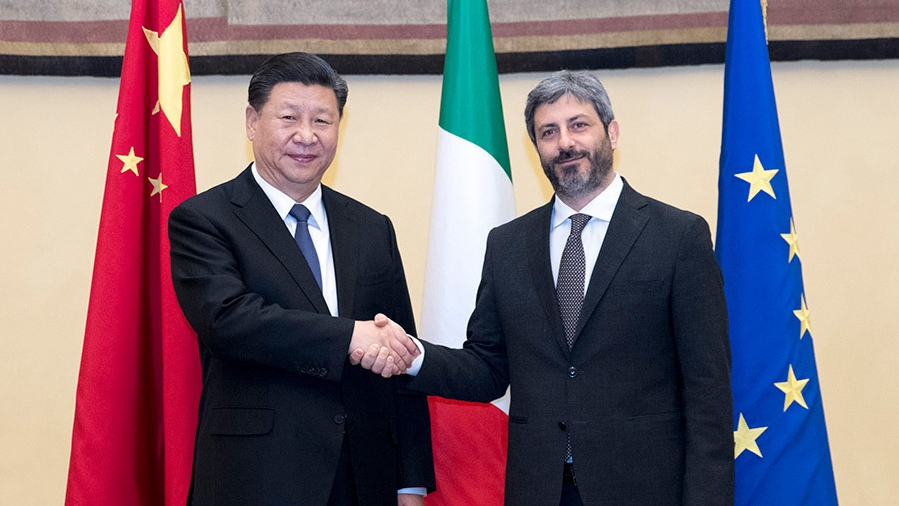
Opinion
11:03, 24-Mar-2019
Is China really 'colonizing' Italy?
Alberto Bradanini

Editor's note: Alberto Bradanini is the former Italian ambassador to China from 2013 to 2015. He served in China for a total of 10 years: from 1991 to 1996 as Commercial Counselor at the Embassy of Italy, then Consul General in Hong Kong from 1996 to 1998, and finally Ambassador of Italy in Beijing. The article reflects the author's opinion, not necessarily the views of CGTN.
China was the starting point of the ancient Silk Road while Italy was the destination. Now, the two countries will intersect again under the Belt and Road Initiative (BRI) as Italy has become the first country in the G7 to sign a cooperation document on the BRI with China.
However, a comment by Italian Deputy Prime Minister Matteo Salvini stimulated skepticism on the disagreement over the government's decision to join BRI, as he said that he refused to see foreign companies “colonizing Italy.”
In my point of view, Salvini's words are typical language that politicians use only for domestic consumption. Nobody within the Italian government really thinks that China intends to colonize Italy.
As the second-largest trade partner with the EU, China has a lot of investment and trade with other European countries, such as Germany, the Netherlands, UK and France.
In particular, bilateral trade between China and Germany is around 170 billion EUR on a yearly basis, with a surplus for Berlin of 18.3 billion EUR. Trade between China and the Netherlands is 96 billion EUR, with the UK at 77, France at 50 and Italy only at 44.
According to a report by Rhodium Group and the Mercator Institute for China Studies, "The Big Three" EU economies received the greatest share of China's investment. The UK (4.2 billion euros), Germany (2.1 billion euros) and France (1.6 billion euros) continue to receive the most attention, but their share in total Chinese FDI declined from 71 percent in 2017 to 45 percent in 2018.
Two newcomers made it to the top five list (Sweden and Luxembourg), propping up the relative shares of Northern Europe and Belgium, the Netherlands and Luxembourg (Benelux) in total investment.
So why is Italy in the firing line as China intends to further expand its cooperation with Italy?
For Italy, participation in this great Chinese project is a good opportunity, under certain conditions.

Chinese President Xi Jinping (L) meets with Roberto Fico, president of the Italian Chamber of Deputies, in Rome, Italy, March 22, 2019. /Xinhua Photo
Chinese President Xi Jinping (L) meets with Roberto Fico, president of the Italian Chamber of Deputies, in Rome, Italy, March 22, 2019. /Xinhua Photo
So far, 24 countries in Europe have already signed cooperation documents with China. If Germany, France or UK do not follow suit, that may be because they are under the pressure from Americans; however, on the other hand, they keep doing business with China directly or through financial institutions such as the Asian Infrastructure Investment Bank, or through their economic activity in many countries located between China and Europe along the route of the BRI.
Coming back to Italy, the Italian government intends to partake in infrastructure development with China in countries between China and Europe. The achievement of concrete results, however, will require efficiency and professionalism. Italy should gather together suitable companies, bringing them with the banking system to those countries, with the support of selected Chinese partners, in a win-win approach and fair sharing of benefits.
As for Europe, which is a liability rather than an asset for Italy - due to a policy of austerity - it does not help much of the Italian economy to grow. The Italian government has been left alone. In this regard, a totally different economic and monetary policy would be needed, with huge public investments, a budget deficit of 10 percent not a paltry 2.04 percent, since with high unemployment/underemployment there is no risk of inflation.
But Germany - along with the EU institutions - has different views and interests. If this scenario is going to continue, Italy risks becoming a underdeveloping country.
I hope that the signing of this document marks the recovery of Italy's independence in a different vision of European solidarity and international relations, promoting a new and more active cooperation path with a great nation like China.
Even the United States, in an inclusive view of international relations, should look at BRI as a source of great opportunities and benefits, accepting that China has come back to be a peaceful protagonist of the international economy and politics. I know this perspective belongs to the world of dreams, yet as a great Taoist philosopher would say: "We, the men of present time, are the makers of history, because heaven and earth are both indifferent to the destiny of Man."
(If you want to contribute and have specific expertise, please contact us at opinions@cgtn.com.)

SITEMAP
Copyright © 2018 CGTN. Beijing ICP prepared NO.16065310-3
Copyright © 2018 CGTN. Beijing ICP prepared NO.16065310-3